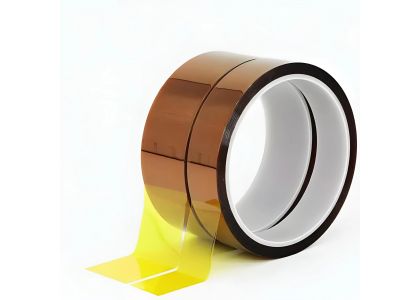
Kapton tape is renowned for its exceptional versatility and performance across various industries, including aerospace, electronics, and manufacturing. Often referred to as polyimide tape for 3D printing, polyimide film tape for PCB masking, polyimide film tape for wafer, and Kapton tape for micro transfer printing, this high-performance tape offers unique properties that make it indispensable in a wide range of applications.
Understanding the capabilities and uses of Kapton tape can help businesses maximize its benefits and improve their processes in critical projects.
Kapton tape is made from a polyimide film, known for its remarkable heat resistance, chemical stability, and excellent dielectric properties. Originally developed by DuPont, this tape can endure extreme temperatures ranging from -269°C to +400°C, making it ideal for applications where traditional adhesives would fail.
Additionally, its non-stick surface allows Kapton tape to be removed cleanly, making it particularly useful in environments where cleanliness is paramount. Its electrical insulation characteristics further enhance its applicability in various electronic and manufacturing industries.
Before delving into specific applications, let’s explore the key properties that make Kapton tape a preferred choice across different sectors:
· High-Temperature Resistance: Capable of withstanding very high temperatures without losing adhesion or integrity.
· Chemical Resistance: Resistant to a wide array of chemicals, making it suitable for various industrial applications.
· Electrical Insulation: High dielectric strength allows for effective insulation in electronic applications.
· Non-Stick Surface: Facilitates easy removal without residue, ideal for processes that require precision and cleanliness.
In the aerospace field, the use of Kapton tape is critical. Its ability to withstand extreme temperature fluctuations and harsh conditions makes it ideal for applications in aircraft and spacecraft.
· Thermal Insulation: Kapton tape is used to insulate wiring and components exposed to high heat. Its performance ensures the functionality and safety of crucial systems.
· Component Masking: During painting and surface treatment processes, Kapton tape serves as an effective masking solution, protecting sensitive areas from overspray and damage.
The electronics industry benefits significantly from polyimide film tape for PCB masking. Kapton tape is employed extensively in printed circuit board manufacturing due to its superior dielectric properties.
· PCB Masking: When creating printed circuit boards, this tape enables precise masking of the board's surface, protecting areas from solder and other contaminants during the production process.
· Electrical Insulation: It acts as an insulator for wires and components, ensuring that electrical circuits remain stable and free from shorts.
One of the emerging uses of Kapton tape is in polyimide tape for 3D printing. This versatile tape offers several benefits:
· Build Surface Preparation: Kapton tape provides an excellent surface for 3D prints to adhere to, reducing warping. Its non-stick properties also enable easy removal of printed parts without damage.
· Heat Resistance: During the 3D printing process, the ability to withstand high temperatures ensures that the tape maintains its integrity throughout the printing cycle.
In semiconductor production, polyimide film tape for wafer is indispensable. The delicate nature of semiconductor components necessitates precise handling and masking.
· Wafer Masking: Kapton tape is used to mask wafers during etching and other processing stages. Its ability to withstand chemicals and high temperatures ensures that the wafers remain undamaged and contamination-free.
· Electrical Insulation: Similar to its function in electronics, Kapton tape provides electrical insulation for various semiconductor components.
In micro transfer printing, Kapton tape for micro transfer printing is vital for success.
· Substrate Protection: This tape helps protect substrates during the printing process, ensuring that delicate printed features remain undamaged.
· Precision Alignment: The excellent adhesion and stable properties of Kapton tape provide the necessary support for precise alignment required in micro transfer printing applications.
A renowned aerospace company implemented Kapton tape for insulating wiring on their latest aircraft model. The engineers reported that using Kapton tape significantly reduced the risk of overheating and electrical shorts, improving overall safety and performance. The tape's capability to ensure reliable insulation in extreme temperatures resulted in more efficient assembly processes.
An electronics manufacturer sought to enhance the quality of their PCB production. By integrating polyimide film tape for PCB masking into their workflow, they achieved a 30% reduction in defects attributed to solder spillage and contamination. The precise masking capabilities of Kapton tape allowed for cleaner, more reliable manufacturing outcomes.
A satisfied user from a 3D printing firm noted, "We switched to polyimide tape for 3D printing, and it has transformed our print quality. The adhesion is fantastic, and parts release flawlessly every time. It has significantly improved our production efficiency."
When selecting Kapton tape for specific applications, consider the following factors:
· Thickness: The thickness of the film can influence its performance. Be sure to choose the right polyimide film thickness for your application needs.
· Adhesive Type: Different applications may require different adhesive properties. Ensure you select a tape with an adhesive suitable for the intended use.
· Temperature Rating: Confirm that the selected tape can withstand the temperature ranges required for your specific processes.
The versatility of Kapton tape in applications ranging from the aerospace industry to electronics, 3D printing, semiconductor manufacturing, and micro transfer printing showcases its exceptional properties. Whether used as polyimide tape for 3D printing, polyimide film tape for PCB masking, polyimide film tape for wafer, or Kapton tape for micro transfer printing, this high-performance tape plays a crucial role in ensuring the reliability and efficiency of critical processes.
As industries continue to evolve, the demand for reliable and effective materials will only grow. Kapton tape's unique properties position it as an essential tool for manufacturers aiming to meet the challenges of modern production. By understanding its applications and choosing the right type of tape, businesses can enhance their operational effectiveness and product quality.